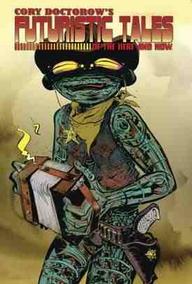News
The Guardian
I've started writing a column for the MediaGuardian, the British website for media professionals, critiquing DRM and explaining "copy-friendly" business models. My first column is up today, explaining the way that DRM is like the Soviet Union's Lysenkoism, a form of ideologically correct junk science.
The companies that sell this stuff are, at best, bunkum peddlers and, at worst, out and out fraudsters. Their wares simply can't work - not without changing the laws of physics, maths and information science.
DRMs are often designed by ambitious, well-funded consortia, with top-notch engineers from every corner of the industry. They spend millions. They take years. They are defeated in days, for pennies, by hobbyists. It's inevitable, because every time you give someone a locked item, you have to give them the key to unlock it too.
Link
Here's part six of my reading of Bruce Sterling's brilliant, seminal book The Hacker Crackdown, a 1992 book that recounts the events that led to the founding of The Electronic Frontier Foundation, my former employer.
MP3 Link

A t-shirt I helped to design is up for sale on Shirt.Woot -- a new t-shirt site from the Woot! people. The shirt's inspiration was this post about the British "Keep Calm and Carry On" tees.
My shirt features the text, "ZOMG TERRISTS GONNA KILL US ALL ZOMG ZOMG ALERT LEVEL BLOODRED RUN RUN TAKE OFF YOUR SHOES MOISTURE BOMBS ZOMG!" around a modified DHS logo, with the eagle clutching an empty water bottle and a pair of shoes.
Shirt.Woot has a funny pricing model. On the first day -- today -- the shirts cost $10 (including shipping!), but only 1000 of them are sold. Starting tomorrow, the shirts go up in price to $15 until August 6. After that, only the top selling Shirt.Woot designs will be offered for sale.
Woot and I have released the shirt's art under a Creative Commons Attribution-NonCommercial-ShareAlike license for your remixing pleasure.
Link
Here's part five of my reading of Bruce Sterling's brilliant, seminal book The Hacker Crackdown, a 1992 book that recounts the events that led to the founding of The Electronic Frontier Foundation, my former employer.
MP3 Link
A reminder: I'll be reading and signing at San Diego's Mysterious Galaxy books tonight as part of a series of San Diego appearances by the writers who are teaching at the Clarion Science Fiction Writers Workshop at UCSD. The reading starts at 7PM -- hope to see you then.
Also: I'll be back in San Diego next week for ComicCon, where I'm one of the guests of honor. Here's my schedule there:
* Thursday, Noon-1PM: Spotlight on Cory Doctorow, room 5AB, followed by a signing
* Friday, 11:30-12:30: IDW publishing, room 4
* Saturday, 1-2PM: Where Do They Get Those Marvelous Toys?, room 8, followed by a signing
A special request for any Canadians planning on attending the Mysterious Galaxy event tonight: I have come down with a miserable cold, and I have run out of Buckley's Mixture (the surprisingly vile and effective Canadian cold-syrup). I would be forever in your debt if you could bring some down with you!
Link to Mysterious Galaxy details, Link to ComicCon schedule
Dr. Graham J. Murphy, a prof in the Cultural Studies and Department of English at Trent University in Peterborough, Ontario, has written a swell academic paper about my novel Eastern Standard Tribe. The essay, "Somatic Networks and Molecular Hacking in Eastern Standard Tribe," was originally published in Extrapolation Vol.48, Issue 1 (2007), from The University of Texas at Brownsville and Texas Southmost College. Graham and his publisher have given me permission to put a PDF of the article up, too!

Art’s Tribal activities as an agent-provocateur are obviously Doctorow’s
satirical critique of a wired marketplace that regularly has the end-user tied to the whims of a hostile corporate culture. Admittedly, Art is initially part of the end-user problem because his loyalty to the ESTribe requires his work at V/DT to be founded on maximizing end-user hostility. It is not until he is in the sanatorium that he has an epiphany that his life has been wasted. After roof-Art has been hurt while trying to escape off the roof, he is introduced to Dr. Szandor, a medical doctor who stands diametrically opposed to the sanatorium’s psychiatrists. Unlike the mental-health practitioners who have repeatedly ignored Art’s claims of wrongful incarceration and have opted to put him on medications that leave him in a drugged stupor, Dr. Szandor actually talks to Art and learns a great deal about the man. A key topic of discussion is the problems with mental-health facilities. During those discussions Art begins to sketch out potential alternatives to the sanatorium system that has him caged, a theoretical facility he dubs HumanCare. Dr. Szandor is noticeably impressed with Art’s acute vision of HumanCare while Art feels “a familiar swelling of pride. I like it when people understand how good I am at my job. Working at V/DT was hard on my ego: after all, my job there was to do a perfectly rotten job, to design the worst user experiences that plausibility would allow. God, did I really do that for two whole goddamned years?” (179). Art comes to recognize that the last two years of his life at V/DT have been a waste because his agent-provocateur mission, founded on end-user hostility and corporate stagnation, has stifled what amounts to his innate skills as a molecular hacker.
PDF Link
Locus Magazine
My latest Locus column is online: "The Progressive Apocalypse and Other Futurismic Delights," from the July issue. This is an essay about the role that futurism (doesn't) play in science fiction, and why so much "futuristic" sf can be set in the present.
Lapsarianism — the idea of a paradise lost, a fall from grace that makes each year worse than the last — is the predominant future feeling for many people. It's easy to see why: an imperfectly remembered golden childhood gives way to the worries of adulthood and physical senescence. Surely the world is getting worse: nothing tastes as good as it did when we were six, everything hurts all the time, and our matured gonads drive us into frenzies of bizarre, self-destructive behavior.
Lapsarianism dominates the Abrahamic faiths. I have an Orthodox Jewish friend whose tradition holds that each generation of rabbis is necessarily less perfect than the rabbis that came before, since each generation is more removed from the perfection of the Garden. Therefore, no rabbi is allowed to overturn any of his forebears' wisdom, since they are all, by definition, smarter than him.
The natural endpoint of Lapsarianism is apocalypse. If things get worse, and worse, and worse, eventually they'll just run out of worseness. Eventually, they'll bottom out, a kind of rotten death of the universe when Lapsarian entropy hits the nadir and takes us all with it.
Running counter to Lapsarianism is progressivism: the Enlightenment ideal of a world of great people standing on the shoulders of giants. Each of us contributes to improving the world's storehouse of knowledge (and thus its capacity for bringing joy to all of us), and our descendants and proteges take our work and improve on it. The very idea of "progress" runs counter to the idea of Lapsarianism and the fall: it is the idea that we, as a species, are falling in reverse, combing back the wild tangle of entropy into a neat, tidy braid.
Of course, progress must also have a boundary condition — if only because we eventually run out of imaginary ways that the human condition can improve. And science fiction has a name for the upper bound of progress, a name for the progressive apocalypse:
We call it the Singularity.
Link
Here's part four of my reading of Bruce Sterling's brilliant, seminal book The Hacker Crackdown, a 1992 book that recounts the events that led to the founding of The Electronic Frontier Foundation, my former employer.
MP3 Link

|









